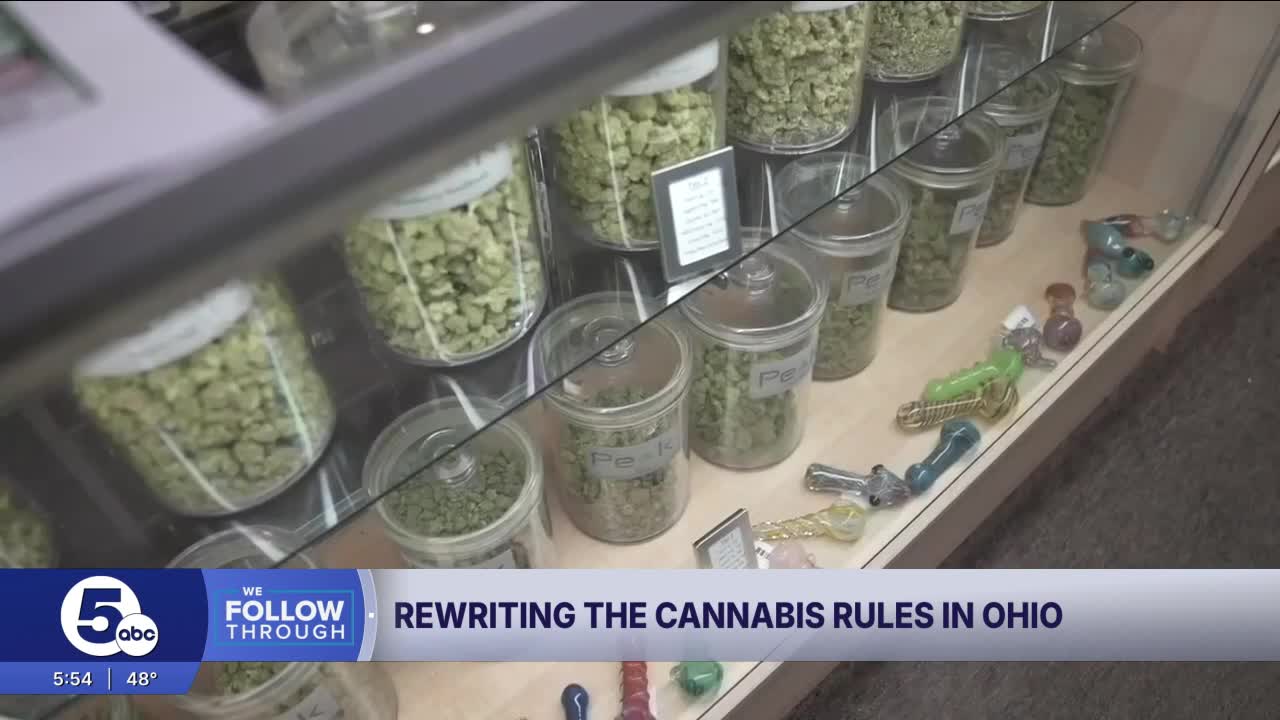COLUMBUS, Ohio — The Ohio House overwhelmingly passed a bipartisan bill reforming both the marijuana and hemp industries.
When voters chose to legalize recreational cannabis in 2023, they knew what they wanted — that's what marijuana industry spokesperson Adrienne Robbins said.
"We want to see that stay put," Robbins, with Ohio Cannabis Coalition, said.
That is why she is supporting the marijuana policy inside amended Senate Bill 56 — the House’s latest effort to pass changes to THC policy.
"You have both parties, all factions of this issue coming together to get this bill done," House Finance Chair Brian Stewart (R-Ashville) said. "And I think it's a big success."
Since the start of the year, Stewart and other marijuana supporters have been trying to compromise with the Senate on separate cannabis bills. The Senate wanted to make dozens of restrictions, but the House said that wasn't what the Ohioans chose.
Stewart, working with House reps. Jamie Callender (R-Concord) and Tex Fischer (R-Boardman) tried to negotiate with the Senate. Callender is known as the marijuana expert, while Fischer calls himself a "hemp-resentative."

RELATED: 2 Ohio Republicans taking on their own party to protect access to marijuana
Finally, a deal was crafted between the two chambers this summer, but the Senate pulled out at the last minute.
"Do you think that this is closer to the will of the voters?" I asked Stewart.
"Oh, absolutely," he responded.
The House’s bill keeps home growing the same, restricts marketing that would appeal to kids and finally gives cities with dispensaries part of the tax revenue from sales.
"That is something these communities have been waiting for," Robbins said. "It is something they were promised."
RELATED: Ohio House to introduce proposal allowing stores to sell THC drinks, but bans other hemp products
The City of Cleveland said it appreciated this step by the House.
"We remain hopeful that this will advance through the Legislature and that we receive these funds soon, which will go towards pressing needs in our community — including public safety," city spokesperson Tyler Sinclair said.
But hemp seller Doug Strahm said this legislation isn't fair.
"They're looking at trying to financially knock people out of the business, and that's not what this country's all about," Strahm said.
The legislation generally bans intoxicating hemp products, low-level THC that's been commonly available at gas stations and smoke shops. It's also frequently packaged to look like candy and doesn't have age restrictions. But under the bill, there are some exceptions for low-level products, and stores can still sell THC-infused drinks to people 21 and older.
The bill also sets up a legal framework to regulate hemp products similar to marijuana. But Strahm complained it comes at a high cost — $5,000 more than a license for cannabis dispenseries.
"To try to come into the hemp business at $75,000 for a new license, even though it's over a two year period, that makes it really difficult," he said.
Stewart argued that this is about safety — making sure children don't get THC and that adults know what's in the products they are buying.
"It kind of balances — keep it away from kids, but also doesn't put people out of business arbitrarily," Stewart said.
Now the bill goes back to the Senate for negotiations — and Senate President Rob McColley (R-Napoleon) wasn't thrilled with the bill.
"There are going to be some things that are probably some members of our caucus will have issues with," McColley said.
I asked him what the concerns are so far.
"It's a brand new regulatory scheme for hemp, relative to what we had been talking about... Some of the other items regarding how they're treating products and everything, we have some concerns about that," McColley said.
After the story aired, Robbins added that while she supports the marijuana provisions in the bill, she doesn't support the hemp portion. When asked why, she said she still needs to look through the bill further to see what changes she wants to see regarding the hemp regulation, but has some concerns already — similar to McColley.
The marijuana industry and the hemp industry are rivals, and several dispensaries have previously told us that they don't think hemp should be sold without having a full marijuana license.
Hemp industry coalition leader Dakota Sawyer said he is trying to talk to convince the Senate not to concur.
When asked about how to tackle the conference committee, the House said they knew their priorities and would represent the people of Ohio — while also making sure that all THC products are safe and regulated.
Follow WEWS statehouse reporter Morgan Trau on Twitter and Facebook.





